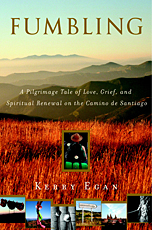Kerry Egan grew up in Long Island, New York, and received her B.A. from Washington and Lee University and her Master's of Divinity from Harvard University Divinity School. While in seminary, she was a research assistant at Harvard's Center for the Study of World Religions. Egan draws upon that education in this spiritual memoir of her pilgrimage to northern Spain on the medieval route of the Camino de Santiago. She was accompanied by Alex, her lawyer boyfriend who views himself as her protector and Sancho Panza. While others go on pilgrimages to draw closer to God, to offer thanksgiving, or to do penance, Egan hopes to find a roadmap for what she should do with her life. She also wants to square off with her father's death and her grieving process. It turns out that this retreat from study is just the right thing to do: she needs some time apart from the normal routines and pressures of life.
The strength of Fumbling is that it opens up new doors to the idea of prayer as discerning the presence of God in our experiences. Egan struggles with the physical ordeal of walking eight to ten hours a day. She roils against the heat of the sun and Alex's irritating actions. She recalls many memories of her father and her ambivalent feelings toward him. During this intense grieving process, she realizes that she cannot redo the past and the true challenge is to live in the present moment.
Another strength is the author's asides on various themes related to pilgrimage such as relics, indulgences, asceticism, penance, beauty, and apparitions of Mary. Egan's Catholic background and her ecumenical studies enable her to make these passages interesting. The title points to the failures and blunders Egan and Alex make on the trip. Unlike other more diligent and disciplined pilgrims, they rest every third day and stay in more hotels than pilgrim hostels. They do not bond with others on the journey. The transformation comes not through community experience but within Egan: "I needed to be cracked open by breathing, by beauty, by anger, by joy, by love." She then begins to ask the right questions.
This spiritual process ought to appeal to seekers who learn from reading about the transformative experiences of others. Egan also makes it clear that grief is a long and arduous process that can be seen as a deep form of prayer.
